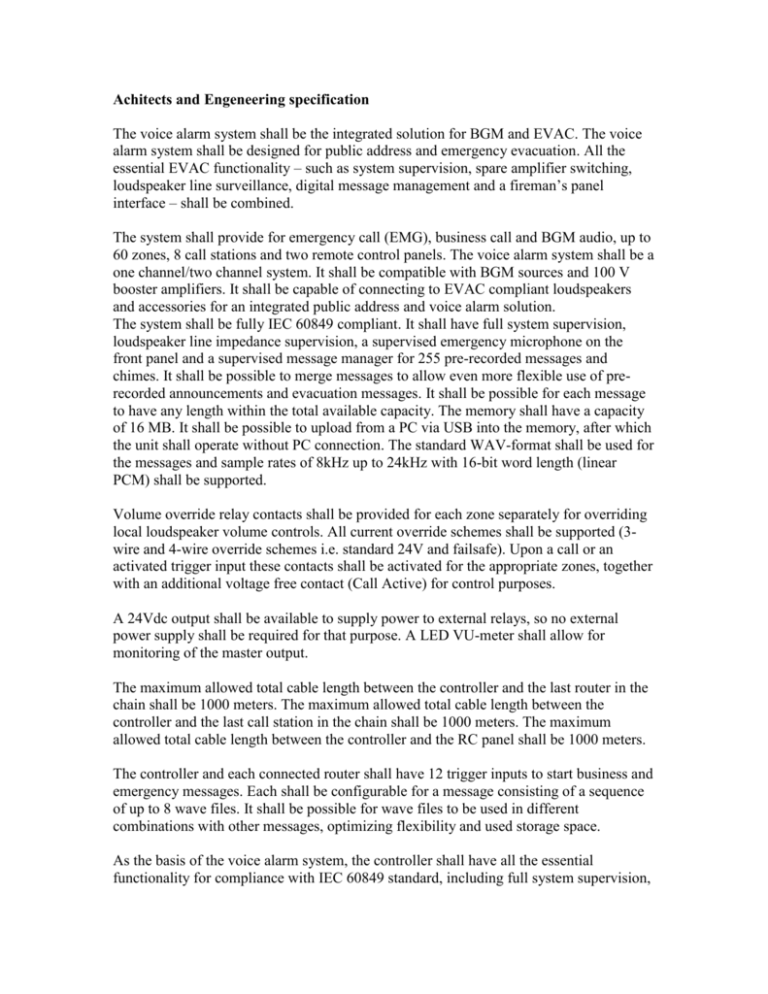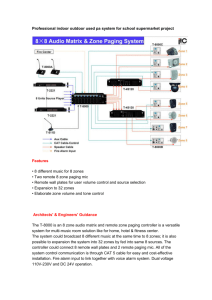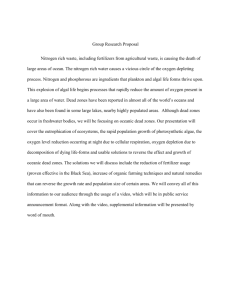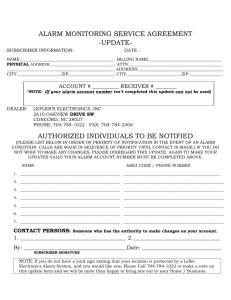A/E Specification - Bosch Security Systems
advertisement

Achitects and Engeneering specification The voice alarm system shall be the integrated solution for BGM and EVAC. The voice alarm system shall be designed for public address and emergency evacuation. All the essential EVAC functionality – such as system supervision, spare amplifier switching, loudspeaker line surveillance, digital message management and a fireman’s panel interface – shall be combined. The system shall provide for emergency call (EMG), business call and BGM audio, up to 60 zones, 8 call stations and two remote control panels. The voice alarm system shall be a one channel/two channel system. It shall be compatible with BGM sources and 100 V booster amplifiers. It shall be capable of connecting to EVAC compliant loudspeakers and accessories for an integrated public address and voice alarm solution. The system shall be fully IEC 60849 compliant. It shall have full system supervision, loudspeaker line impedance supervision, a supervised emergency microphone on the front panel and a supervised message manager for 255 pre-recorded messages and chimes. It shall be possible to merge messages to allow even more flexible use of prerecorded announcements and evacuation messages. It shall be possible for each message to have any length within the total available capacity. The memory shall have a capacity of 16 MB. It shall be possible to upload from a PC via USB into the memory, after which the unit shall operate without PC connection. The standard WAV-format shall be used for the messages and sample rates of 8kHz up to 24kHz with 16-bit word length (linear PCM) shall be supported. Volume override relay contacts shall be provided for each zone separately for overriding local loudspeaker volume controls. All current override schemes shall be supported (3wire and 4-wire override schemes i.e. standard 24V and failsafe). Upon a call or an activated trigger input these contacts shall be activated for the appropriate zones, together with an additional voltage free contact (Call Active) for control purposes. A 24Vdc output shall be available to supply power to external relays, so no external power supply shall be required for that purpose. A LED VU-meter shall allow for monitoring of the master output. The maximum allowed total cable length between the controller and the last router in the chain shall be 1000 meters. The maximum allowed total cable length between the controller and the last call station in the chain shall be 1000 meters. The maximum allowed total cable length between the controller and the RC panel shall be 1000 meters. The controller and each connected router shall have 12 trigger inputs to start business and emergency messages. Each shall be configurable for a message consisting of a sequence of up to 8 wave files. It shall be possible for wave files to be used in different combinations with other messages, optimizing flexibility and used storage space. As the basis of the voice alarm system, the controller shall have all the essential functionality for compliance with IEC 60849 standard, including full system supervision, loudspeaker line impedance supervision, a supervised emergency microphone on the front panel and a supervised message manager The messages shall be mergable to allow even more flexible use of pre-recorded announcements and evacuation messages. The controller shall be used as a stand-alone system with up to 6 zones, or expanded to up to 60 zones using additional 6-zone routers. Up to 8 call stations shall be connectable. Interconnections shall be made using standard RJ45 connectors and CAT5 cable. It shall be possible to connect 480 watts per router. The audio output shall use standard analog audio 100 V line switching for full compatibility with public address equipment and EVAC-compliant loudspeakers. The system shall be configured using DIP switches for basic functionality and a PC for more advanced functions. It shall be possible to specify 16 priority levels. A built-in 240 W booster amplifier shall provide the power for the emergency call channel and BGM. It shall be possible to add additional booster amplifiers as spare, to provide two-channel operation or if the total power requirement exceeds 240 W (maximum 480 W per 6 zones). All booster amplifiers shall be supervised. The maximum/rated output power of the internal booster shall be 360 W / 240 W. max mains inrush current shall be 8A @ 230 Vac / 16A @ 115 Vac The frequency response shall be 60 Hz – 18 kHz (+1/-3 dB, @ -10 dB ref. rated output. The distortion shall not exceed 1% at the rated output, 1 kHz. The controller shall have tone controls to allow for adjustment of the BGM sound. It shall have separate bass and treble controls. The controller shall have two BGM source inputs and a mic/line input with configurable priority, speech filter, phantom power and selectable VOX activation. It shall be possible to select 16 priority levels for microphone, call stations and trigger inputs for optimum system flexibility. It shall have two connectors to connect the call stations. It shall have 12 input triggers with 6 supervised trigger inputs. Furthermore it shall have one tape output on cinch connectors. The trigger outputs shall be on floating relays with a rating of 250V 7A. The controller shall have an emergency active relay, a fault relay and two general purpose relays, for control purposes. The fault relay shall be failsafe. The output section shall have six transformer-isolated 100 V constant voltage outputs for driving 100 V-loudspeakers in six separate zones. All zones shall be individually selectable from the front panel and the BGM output level in each zone shall be individually settable in 6 steps. The BGM output shall be connected to the 70V line, thus it shall be possible to connect a total load of 480 Watts in a two channel system combined with a 480 Watt booster. The output of the booster shall be also available as a separate output on 100V and 70 V. A separate 100 V Call Only output shall be provided for addressing an area where BGM is not required but where priority announcements are. Six configurable volume override output contacts shall be available for overriding local volume controls during priority calls. A LED VU-meter shall monitor the output. The voice alarm router shall be an expansion unit adding 6 zones as well as 12 input- and 8 output contacts to the voice alarm system. It shall be able to use the booster built in the voice alarm controller. It shall provide outputs and inputs for one or two boosters in a multi amplifier one- or two-channel system. It shall provide dual channel operation for calls and BGM simultaneously to a maximum of six different zones, using two booster amplifiers. Also single channel operation shall be possible with only one booster. The router shall have a set of relays for zone-switching the power amplifier output(s) to different loudspeaker groups. Each of the zones shall be switched between the call channel (upon call-station selection or all-call microphone or emergency activation), the BGM channel (upon front panel selection), or off. The zone power handling capacity of the router shall be 480 Watts. The router shall also have 12 input triggers. 6 triggers shall be supervised for EMG purposes. The 6-zone call station shall be a stylish high quality call station with a stable metal base, a flexible microphone stem and a unidirectional condenser microphone. It shall be intended for making calls to selected zones. The special design shall allow for neatly flush mounting in desk tops. Using dipswitches on the bottom of the call station, the call station ID shall be selectable. The call station shall have selectable gain, speech filter and limiter for improved intelligibility. On each call station it shall be possible to select 6 zones with the possibility to connect a call station keypad to increase the number of zones or zone groups that can be selected. It shall have LED indications for zone selection, fault and emergency state. The call station extension shall provide seven additional zone and zone group keys On each call station it shall be possible to select 6 zones with the possibility to connect up to 8 call station keypads to increase the number of zones or zone groups that can be selected. Selected zones are indicated with LEDs on the call station, three additional LEDs give visible feedback on the active state of the microphone and the system. Green indicates microphone active, amber indicates that the system has detected a fault (IEC 80649) and red indicates that the system shall be in the emergency state. The power supply voltage range shall be 18 – 24V with a current consumption of less than 50 mA. The nominal sensitivity shall be 85 dB SPL (gain preset 0dB). The nominal output level shall be 700 mV. The maximum allowable sound pressure level shall be 110 dBSPL. The microphone shall have a limiter. The distortion shall be less than 0.6% at maximum input. The equivalent input noise level shall be no more than 30 dBSPLA. The frequency range shall be 100Hz – 16kHz. The speech filter shall be a 315 Hz, high-pass, 6 dB/oct filter. The output impedance shall be 200 Ohms. The stem length with microphone shall be 390 mm. Mains voltage shall be both 230Vac and 115Vac, ±15%, 50 / 60Hz (selectable) Power consumption of the Controller shall not exceed 600 Watts, the router shall not exceed 50Watts. Battery backup provisions shall be implemented, the battery voltage shall be 24Vdc, +20% / -10%. All low level connections and volume override shall be on MC1,5/XX-ST-3,5 type connector blocks. All high level connections except mains shall be on MSTB 2,5 /XX-ST. The input contact shall have supervision based on a series and parallel resistor. The router and controller shall be rack mountable with removable rack mounts. The router shall be not higher than 2U. The controller shall be not higher than 3U. The rack mounting kit shall be included. The operating temperature range shall be -10°C to +55°C. The storage temperature range shall be -40°C to +70°C. The system shall comply to the following standards: EVAC compliance acc. to IEC 60849 EMC emission acc. to EN 55103-1 EMC immunity acc. to EN 55103-2 Safety acc. to EN 60065 The system shall be the Bosch Plena Voice Alarm System. The controller shall be the Bosch Plena Voice Alarm Controller 1990/00. The router shall be the Bosch Plena Voice Alarm Router 1992/00. The call station shall be the Bosch Plena Voice Alarm Call Station 1956/00. The cal station shall be the Bosch Plena Voice Alarm Call Station Keypad 1957/00






